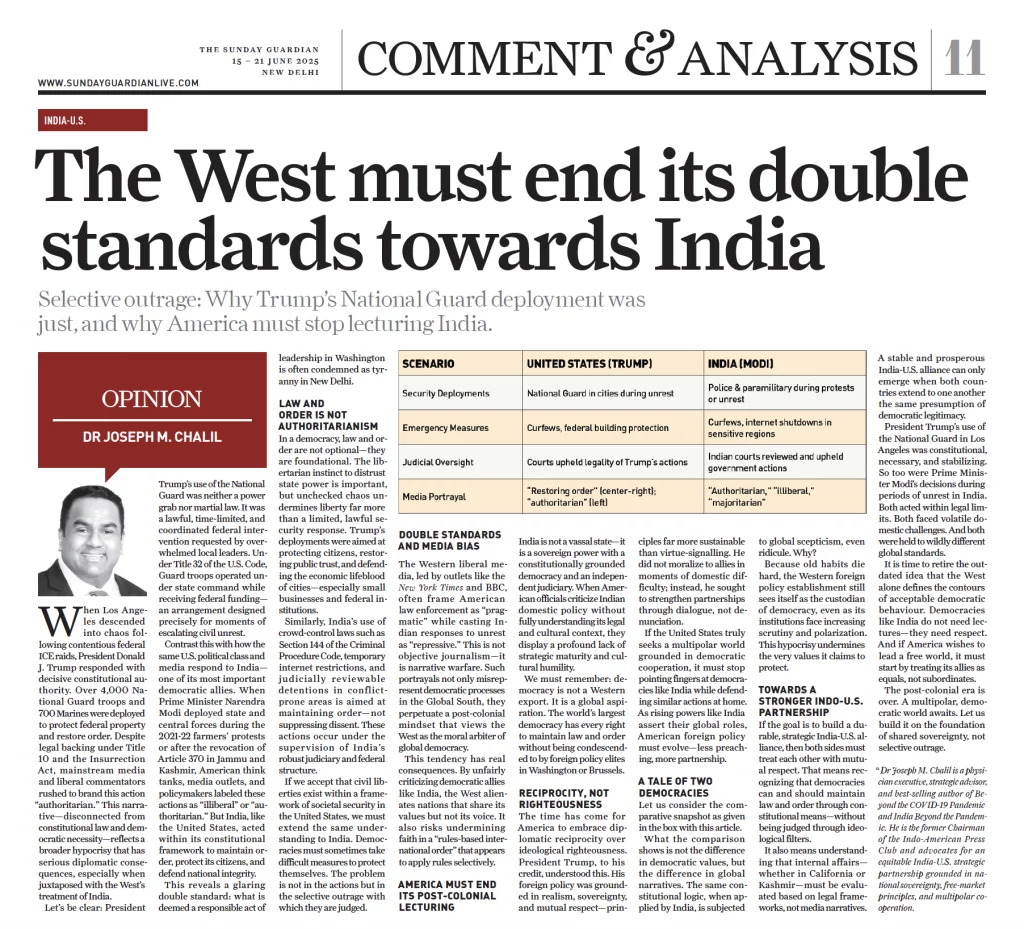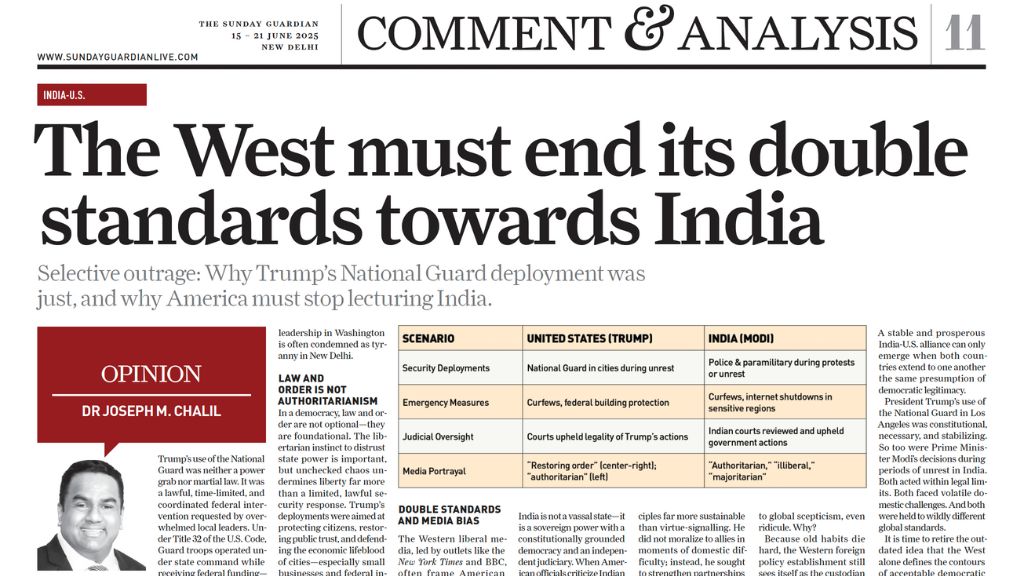Selective outrage: Why Trump’s National Guard deployment was just, and why America must stop lecturing India.
When Los Angeles descended into chaos following contentious federal ICE raids, President Donald J. Trump responded with decisive constitutional authority. Over 4,000 National Guard troops and 700 Marines were deployed to protect federal property and restore order. Despite legal backing under Title 10 and the Insurrection Act, mainstream media and liberal commentators rushed to brand this action “authoritarian.” This narrative—disconnected from constitutional law and democratic necessity—reflects a broader hypocrisy that has serious diplomatic consequences, especially when juxtaposed with the West’s treatment of India. Let’s be clear: President Trump’s use of the National Guard was neither a power grab nor martial law. It was a lawful, time-limited, and coordinated federal intervention requested by overwhelmed local leaders. Under Title 32 of the U.S. Code, Guard troops operated under state command while receiving federal funding—an arrangement designed precisely for moments of escalating civil unrest.
Contrast this with how the same U.S. political class and media respond to India—one of its most important democratic allies. When Prime Minister Narendra Modi deployed state and central forces during the 2021-22 farmers’ protests or after the revocation of Article 370 in Jammu and Kashmir, American think tanks, media outlets, and policymakers labeled these actions as “illiberal” or “authoritarian.” But India, like the United States, acted within its constitutional framework to maintain order, protect its citizens, and defend national integrity.
This reveals a glaring double standard: what is deemed a responsible act of leadership in Washington is often condemned as tyranny in New Delhi.
LAW AND ORDER IS NOT AUTHORITARIANISM
In a democracy, law and order are not optional—they are foundational. The libertarian instinct to distrust state power is important, but unchecked chaos undermines liberty far more than a limited, lawful security response. Trump’s deployments were aimed at protecting citizens, restoring public trust, and defending the economic lifeblood of cities—especially small businesses and federal institutions.
Similarly, India’s use of crowd-control laws such as Section 144 of the Criminal Procedure Code, temporary internet restrictions, and judicially reviewable detentions in conflict-prone areas is aimed at maintaining order—not suppressing dissent. These actions occur under the supervision of India’s robust judiciary and federal structure.
If we accept that civil liberties exist within a framework of societal security in the United States, we must extend the same understanding to India. Democracies must sometimes take difficult measures to protect themselves. The problem is not in the actions but in the selective outrage with which they are judged.
DOUBLE STANDARDS AND MEDIA BIAS
The Western liberal media, led by outlets like the New York Times and BBC, often frame American law enforcement as “pragmatic” while casting Indian responses to unrest as “repressive.” This is not objective journalism—it is narrative warfare. Such portrayals not only misrepresent democratic processes in the Global South, they perpetuate a post-colonial mindset that views the West as the moral arbiter of global democracy.
This tendency has real consequences. By unfairly criticizing democratic allies like India, the West alienates nations that share its values but not its voice. It also risks undermining faith in a “rules-based international order” that appears to apply rules selectively.
AMERICA MUST END ITS POST-COLONIAL LECTURING
India is not a vassal state—it is a sovereign power with a constitutionally grounded democracy and an independent judiciary. When American officials criticize Indian domestic policy without fully understanding its legal and cultural context, they display a profound lack of strategic maturity and cultural humility.
We must remember: democracy is not a Western export. It is a global aspiration. The world’s largest democracy has every right to maintain law and order without being condescended to by foreign policy elites in Washington or Brussels.
RECIPROCITY, NOT RIGHTEOUSNESS
The time has come for America to embrace diplomatic reciprocity over ideological righteousness. President Trump, to his credit, understood this. His foreign policy was grounded in realism, sovereignty, and mutual respect—principles far more sustainable than virtue-signalling. He did not moralize to allies in moments of domestic difficulty; instead, he sought to strengthen partnerships through dialogue, not denunciation.
If the United States truly seeks a multipolar world grounded in democratic cooperation, it must stop pointing fingers at democracies like India while defending similar actions at home.
As rising powers like India assert their global roles, American foreign policy must evolve—less preaching, more partnership.
A TALE OF TWO DEMOCRACIES
Let us consider the comparative snapshot as given in the box with this article. What the comparison shows is not the difference in democratic values, but the difference in global narratives. The same constitutional logic, when applied by India, is subjected to global scepticism, even ridicule. Why?
Because old habits die hard, the Western foreign policy establishment still sees itself as the custodian of democracy, even as its institutions face increasing scrutiny and polarization. This hypocrisy undermines the very values it claims to protect.
TOWARDS A STRONGER INDO-U.S. PARTNERSHIP
If the goal is to build a durable, strategic India-U.S. alliance, then both sides must treat each other with mutual respect. That means recognizing that democracies can and should maintain law and order through constitutional means—without being judged through ideological filters.
It also means understanding that internal affairs—whether in California or Kashmir—must be evaluated based on legal frameworks, not media narratives.
A stable and prosperous India-U.S. alliance can only emerge when both countries extend to one another the same presumption of democratic legitimacy. President Trump’s use of the National Guard in Los Angeles was constitutional, necessary, and stabilizing. So too were Prime Minister Modi’s decisions during periods of unrest in India. Both acted within legal limits. Both faced volatile domestic challenges. And both were held to wildly different global standards.
It is time to retire the outdated idea that the West alone defines the contours of acceptable democratic behaviour. Democracies like India do not need lectures—they need respect. And if America wishes to lead a free world, it must start by treating its allies as equals, not subordinates.
The post-colonial era is over. A multipolar, democratic world awaits. Let us build it on the foundation of shared sovereignty, not selective outrage.
Dr Joseph M. Chalil is a physician executive, strategic advisor, and best-selling author of Beyond the COVID-19 Pandemic and India Beyond the Pandemic. He is the former Chairman of the Indo-American Press Club and advocates for an equitable India-U.S. strategic partnership grounded in national sovereignty, free-market principles, and multipolar cooperation.


